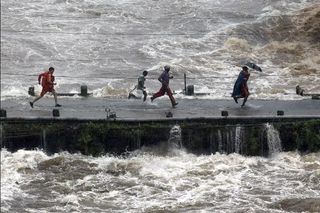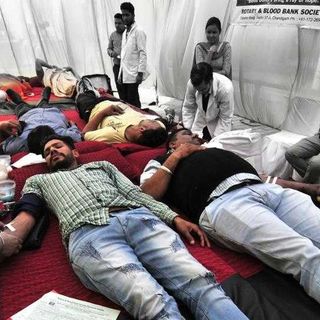
Report: More People Died Due to Climate Change in India Than Anywhere Else in the World in 2018
Overall, India was the fifth-worst-hit country due to climate change in 2018.

A range of extreme weather events in 2018 — think extreme rainfall, floods, landslides, cyclones, and heatwaves — claimed 2,081 lives in India, the most of 181 other countries that featured on a new global climate risk index. Japan, which ranked first on this index, recorded 1,282 deaths.
In terms of economic losses, India ranked second. Overall, per this index, in 2018, India was the fifth-worst-hit country by climate change, pushed up by nine ranks from 2017, when it was the 14th.
These rankings were recently released by the non-profit Germanwatch in a report titled The Global Climate Risk 2020, the results of which are calculated based on average values over a 20-year period, i.e., 1998 to 2018.
Japan, the Philippines, Germany, and Madagascar were on the first four positions for overall worst-hit, followed by India.
“In 2018, India was affected by a range of extreme weather events including floods in Kerala, tropical cyclones like Gaja and Titli, as well as a prolonged heatwave, all of which have collectively propelled India to the top position,” Vera Kunjel, lead author of the index, told DownToEarth.
Talking of rainfall-related calamities such as cyclones, floods, and landslides, as many as 6,585 people have died in India in the three-year period leading up to July 2019, per another report by IndiaSpend.
In 2019 alone, the southwest monsoon rains have been the heaviest India has experienced in 25 years, claiming 1,685 lives — roughly 14 deaths a day on an average, the same report highlighted.
“The high-intensity rainfall that we are witnessing [a part of it] is because climate change is influencing our weather patterns,” Hem Dholakia, senior research associate at Council on Energy, Environment and Water, a New Delhi-based think-tank, said to IndiaSpend. “Science has not reached that point yet [of establishing or associating a single event/incident to climate change] but what we can definitely say that climate change influences the frequency and intensity of such extreme events.”
Related on The Swaddle:
All the Arguments You Need: To Convince People That Individual Behavior Does Affect Climate Change
Take the Kerala floods for instance. In what can be called a repeat of the floods that took place in 2018, in 2019, too, the state experienced devastating floods that killed at least 92 people, while 58 were reported missing. About 250,638 people were displaced, and 13 of the 14 state’s districts had to be put on high alert. The new risk assessment called the Kerala disaster, “the worst in a hundred years.”
“Climate change is a reality and it must be taken seriously. Kerala is, in fact, facing the combined after-effects of climate change, population pressure, and unscientific land utilization,” Kusala Rajendran, professor at the Centre for Earth Sciences at Indian Institute of Science in Bangalore, told mongabay.com.
Where heatwaves are concerned, the new risk index stated, “Since 2004, India has experienced 11 of its 15 warmest recorded years.” The 2018 heatwave was regarded as, “one of the longest recorded heatwaves … with hundreds of deaths.”
In 2018, the Indian Meteorological Department had warned that temperatures could reach as high as 48 degrees Celsius. In the same year, Delhi joined other states, including Rajasthan, Andhra Pradesh, and Telangana, to record temperatures as high as 46 degrees Celsius, per a World Economic Forum (WEF) report. “In January, the IMD said 2017 was one of the warmest years in the country’s history; it followed the hottest recorded year in over a century, 2016, when hundreds of Indians died of sunstroke. Between 2013 and 2016, over 4,000 Indians lost their lives to heat — and it is likely that the numbers are under-reported,” the WEF report stated.
Related on The Swaddle:
Climate Change Could End Human Civilization by 2050
The impact of climate change and the extreme changes in weather it brings about is not limited to humans only. It also results in great economic losses, not just in developing economies but even in developed countries such as Japan and Germany, which ranked before India. The U.S. was found to have suffered the most in terms of economic losses over a period of two decades.
The new index reported India losing as much as US$38 million to climate change in 2018 – a three-fold increase on the losses suffered in 2017. In the next decade, until 2030, developing countries will lose US$290 billion to US$580 billion to climate-related emergencies, the index mentioned; India’s economy could shrink by 10% just because of climate change, suggests another report.
“This is a clear signal that climate change impacts are happening, and increasing everywhere, including in developed countries,” another index author, Maik Winges, told DownToEarth.
Anubhuti Matta is an associate editor with The Swaddle. When not at work, she's busy pursuing kathak, reading books on and by women in the Middle East or making dresses out of Indian prints.
Related


Know Your Rights: Property Rights for Women
